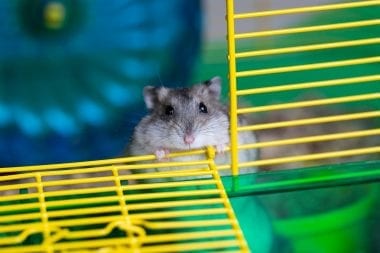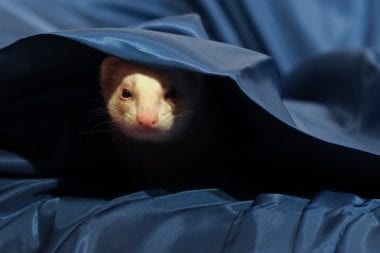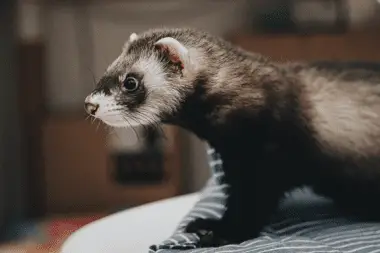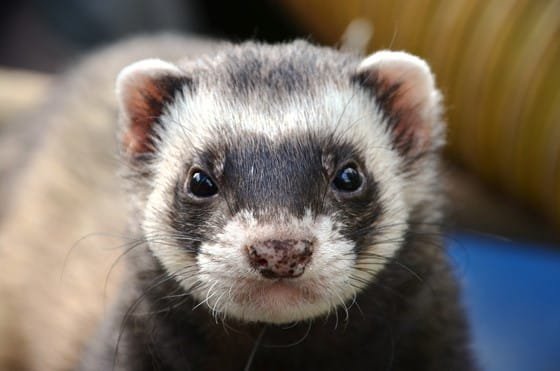
Ferrets are similar to owning a cat or a dog. They like to sleep extensively like cats and are trained for using litter boxes. Similar to dogs, ferrets are very social creatures and love to have company of people around. Although similar, Ferrets are also different in their won unique way. They make great pets owing to their friendly nature, high curiosity, and the super cute and cuddly face. Many people love to own a ferret once they come across one in a pets shop or fair. In this article we will discuss the different features of a ferret which makes them unique and how to take care of one.
Fun Facts About Ferrets
They are a member of the weasel group of family in the animal kingdom. An average ferret would weight anywhere between 1 pound to 5 pounds. A full grown healthy ferret can live up to ten years as mentioned in the American Ferret Association. They like to hibernate for the most part of the day, so you may find your ferret sleeping around 18 to 20 hours in a day. They are active during the early part of the day and late evening.
The male ferret are referred to as “Hobs” and the female are referred as “Jills”. The young ferrets are known as “Kits” and a group would be called “Business”. They usually have a short hair coat and would come in darker colors such as black and brown. Many ferrets are sprayed with scent and color to lose odor.
They are usually very friendly creatures and love to be around lots of people. They are highly intelligent and respond well to domestic training. A ferret can be trained to perform tricks, respond to calls. They need attention from their owners and are not ideal pets for kids below 6 years.
They need to be trained to control their aggression. Ferrets also have the adorable habit of stealing and hiding things that they find. So don’t leave your keys or important documents lying around or you may have to start a ferret hideout hunt.
They like to chew random items and swallow them. Your house may require ferret proofing before getting one as a pet. Ferrets also suffer health issues and require expensive care. Ferrets can coexist well with larger pets like cats and dogs. However, they do not gel well with smaller pets like guinea pigs, rabbits, birds etc.
Life with a Ferret
The following should be kept in mind before you head out to get your own little ferret.
- The Ferret cage needs to be bought, which are specially made keeping their nature in mind. They like to run away often as they don’t prefer staying put in one place. Multi level cage with open wire construction are best suited to their nature. They need proper ventilation and therefore glass tanks and tubs are not suited for them. The location should preferably be a quiet place with temperature ranging between 50 and 75 Fahrenheit. The cage should include their bedding, litter box and water and must be cleaned regularly. Keep the ferret away from fine shavings as it tends to irritate their digestive system.
- Ferret Diet: Ferrets should be fed food high in protein and fat. There are various ferret food items available in the market which are made exclusively for their food preference. Do not feed your ferret any dairy item and sugar. High fiber food such as vegetables and fruits must be avoided as well. Your ferret needs fresh water daily.
- Ferret Activity: Your ferret is an active animal. They like to chew and swallow anything they can find. You can keep chew toys and food in their cage they can chew and eat if they like. If you want to put toys for your ferret to play with, make sure the toys are hard and not easily swallow able. Avoid plastic, latex or foam or rubber made toys. Your ferrets play area should be properly demarcated from the rest of your house. Remove any small items such as keys, key chain and phones away from their sight. You should also fix up any crack or crevices in the walls as your ferret would be happy to squeeze into anything they find. They love to play so owners must spend an hour of playtime with their ferrets to keep them happy and entertained.
- Ferret Coat: Being from a weasel family, ferrets have the natural habit of cleaning and grooming themselves. They shed their fur couple of times in a year and require combing to remove all the fur they lose and keep their coat smooth. Your ferret would also require regular trimming of their nails. You must brush their teeth on a monthly basis to keep them clean. Due to the bad odor ferrets carry, you can bathe your ferret with special soap sometimes to keep them fresh.
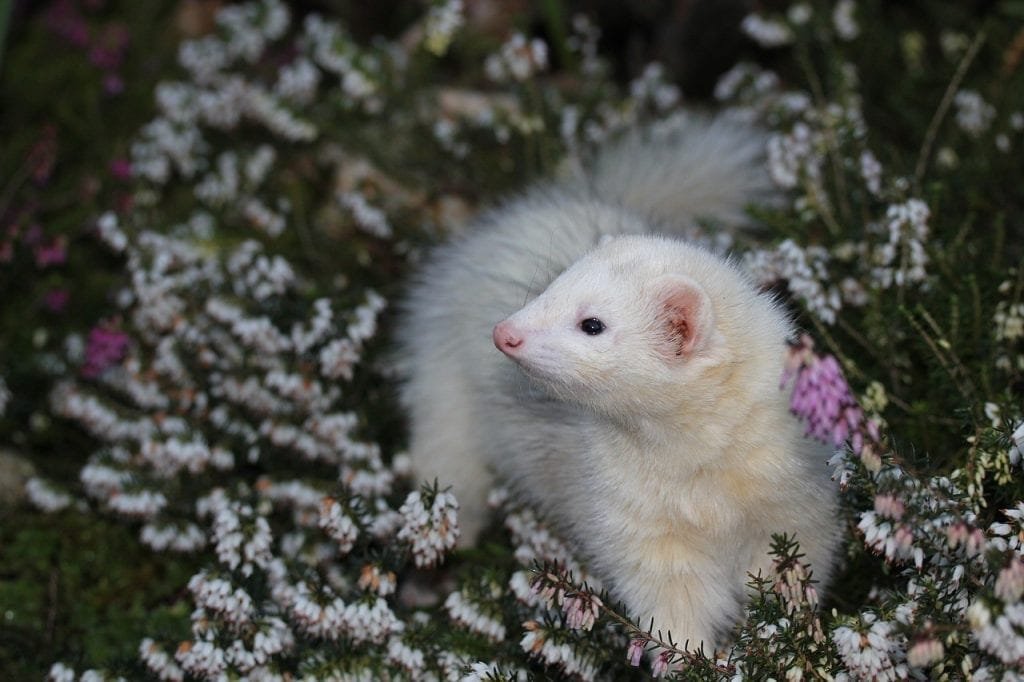
Potential Health Issues
Generally smaller cage animals are expected to low in maintenance as the cost of feeding and grooming is lower compared to larger animals. However, ferrets because of their nature of chewing and swallowing foreign objects, would often suffer from digestive tract issues. They would often suffer gastric issues, ulcers and other diseases related to the pancreas and the adrenal gland. You would notice signs of distress in ferret suffering from any health issues. They would often start to lose hair on their shoulder, hip and tails. Ferrets require hormone therapy or surgery to treat adrenal gland related diseases.
Another common problem is Insulinoma. It happens when the pancreas grows a tumor, which then release excess insulin. The symptoms of Insulinoma include seizures and collapse for few hours. This requires extensive drug treatment or surgery to remove the tumor from the pancreas.
How To Take Care Of Ferrets?
Your Ferret would need physical examination on a regular interval of 6 to months from a ferret expert veterinarian. Further preventive measures to follow include:
- Annualized vaccine to treat distemper virus in canines and prevent rabies
- Regular examination of fecal matter to check for parasite
- Ear examination to check for mites, ticks
- Annual flea and heartworm medicine
- Yearly teeth cleaning from vet
- Blood check-up and glucose level measurement
- Trimming of toenails as required
Many owners would eventually surrender their ferrets after few years of owning to due to extensive medical needs. Their adrenal gland problem is a major reason for owners dumping them. Many owners find it difficult to train them as their training is different from a cat or a dog. Therefore future owners must read and understand the requirement of a ferret before owning one.
Setting Up Your Ferret At Home
- Make sure to purchase wire mesh cage before you get your ferret home. Every ferret will require a 2 sq ft (0.19 m²) of space. If you get two ferrets, you would need a cage which measures 24 inches (0.61 m) in width and 24 inches (0.61 m) in length. Ferrets like to climb as well, so the cage should be tall enough for them to comfortably climb around.
- Always get a carrier for your ferret. You cannot carry your ferret around on a leash when you are visiting vet or going out. A carrier is the best options to carry your ferret safely around.
- A ferret bed is very important. They like comfortable places to sleep and it needs to be above the ground level. There are special ferret hammocks available in the market that can be hung in your ferrets cage. It is convenient for them as they get to climb into it to sleep. Many owners also use a cat bed for their ferrets to sleep in. Your ferrets bed would get soiled more often, so ensure to clean it regularly.
- A food and water dispenser is important. A special dispenser made for smaller animals help against spilling of food and water in the cage. The ferret can safely play with it without any accident.
- In order to keep your ferret healthy and well, a litter box is a must. There are special litter boxes made for ferrets. The litter box must be slid into a corner. You may need to use special paper pellets as litter. Clay litter used for cats are not ideal for ferrets. Ensure to keep your litter box deep as ferret may kick pellets out. You don’t need a deep layer of litter as ferrets do not cover their litter like dogs.
- You must get a leash with a harness for your ferret. You can use the leash and harness when you take your ferret out for walks. Ferrets are active animals, and they need their time out for walks and play. You should not leave your ferret outside loose as they are not protected against larger preys such as cats, dogs, raccoons and other wild animals. Always stay with your ferret when it is outdoor.


